|
 Trichia varia Trichia varia
SynonymsStemonitis varia
BiostatusPresent in region - Indigenous. Non endemic
Images (click to enlarge)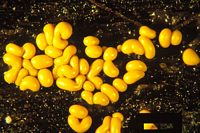
Caption: fresh moist slightly immature sporangia in situ on dead, wet, decorticated wood. Scale bar = 2000 µm.
Owner: Dan Mahoney | 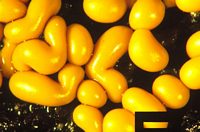
Caption: fresh moist slightly immature sporangia in situ on dead, wet, decorticated wood (closeup from field of photo #1). Scale bar = 800 µm.
Owner: Dan Mahoney | 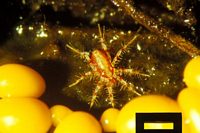
Caption: red mite among the fresh moist slightly immature sporangia; in situ on dead, wet, decorticated wood. Scale bar = 625 µm.
Owner: Dan Mahoney | 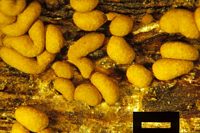
Caption: dry mature sporangia in situ on dead, decorticated wood (nearly same field of view as photo #2). Scale bar = 800 µm.
Owner: Dan Mahoney | 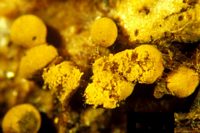
Caption: dry mature sporangia, breaking open to expose their capillitia and spores; in situ on dead, corticated wood. Scale bar = 500 µm.
Owner: Dan Mahoney | 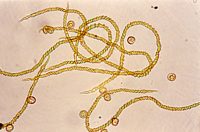
Caption: elaters from the capillitium. (from 70% ethanol mount).
Owner: Dan Mahoney | 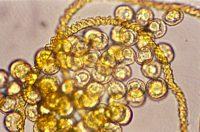
Caption: spores and elaters. (from 70% ethanol mount)
Owner: Dan Mahoney | 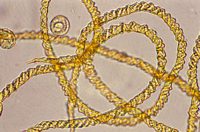
Caption: elaters from the capillitium; showing spiral bands that protrude more on one side than the other. (from 70% ethanol mount).
Owner: Dan Mahoney | 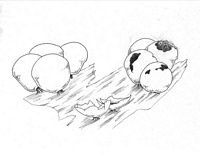
Caption: Sporangia of Trichia varia. Each sporangium is about 0.6 mm in diameter.
Owner: S.L. Stephenson | 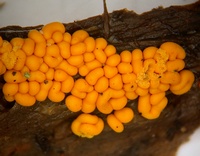
Caption: immature
Owner: J.A. Cooper |
Article: Cooke, M.C. (1879). New Zealand fungi. Grevillea 8(46): 54-68.
Article: Stephenson, S.L. (2003). Myxomycetes of New Zealand. Fungi of New Zealand. Ngā Harore o Aotearoa 3: xiv + 238 p. Hong Kong: Fungal Diversity Press.
Description: Fruiting body a sessile (or occasionally short-stalked) sporangium, gregarious to crowded, globose or obovate to somewhat elongated, yellow to olive-brown to yellow-brown, 0.5–0.9 mm in diameter. Peridium persistent, membranous, shining or sometimes encrusted with darker material. Capillitium yellow to ochraceous, consisting of relatively long, free elaters, 3–5 µm in diameter, bearing 2 (or rarely 3) prominent, widely spaced spiral bands, tips acute, curved, about twice the diameter of the elater in length. Spores yellow to orange-yellow in mass, dull yellow by transmitted light, delicately warted, 12–14 µm in diameter. Plasmodium white.
Habitat: Decaying wood, usually that of broadleaf trees.
Distribution: Cosmopolitan (Martin & Alexopoulos 1969). First reported from New Zealand by Cooke (1879), based on a specimen collected in Dunedin. Also known from Bay of Plenty, Wellington, Gisborne, Hawkes Bay (Colenso 1887), Buller, Nelson, Fiordland, Mid Canterbury, Otago Lakes, and Southland.
Notes: The single most important distinguishing feature of Trichia varia is the capillitium, which is made up of elaters with widely spaced sprial bands that protrude more on one side than the other.
|